Make: PowerSmart
Model: PS50A
Electric Start: No
Fuel: Gasoline
Technology: Traditional
Gas Starting Watts: 1200
Gas Running Watts: 1000
Weight (lbs): 37.6
Noise (dB): 68
The PowerSmart PS50A gasoline-powered portable generator is a popular small and ultralight model that’s an ideal companion for casual campers and those who love the occasional outdoor life. It’s EPA and CARB compliant so for the time being you can used it in California.

Make: PowerSmart
Model: 2500W
Electric Start: No
Fuel: Gasoline
Technology: Inverter
Gas Starting Watts: 2500
Gas Running Watts: 1900
Weight (lbs): 40
Noise (dB): 56
The PowerSmart PS5020W inverter is a super quiet and highly portable generator able to provide you with power outdoors and in your home. It produces clean and reliable power with 2500 peak watts and 1900 running watts and its 1.05 gallon fuel tank allows it to run for up to 11 hours at 25% load.

Make: Honda
Model: EU3200i
Electric Start: No
Fuel: Gasoline
Technology: Inverter
Gas Starting Watts: 3200
Gas Running Watts: 2600
Weight (lbs): 59.1
Noise (dB): 58
Honda are recognized for producing some of the most premium, robust, and reliable portable generators available. This, the EU3200i, is a top notch model, tough, lightweight, and powerful packing a host of useful features including a carbon monoxide sensor designed to keep you safe.

Make: PowerSmart
Model: 4400W
Electric Start: No
Fuel: Gasoline
Technology: Inverter
Gas Starting Watts: 4400
Gas Running Watts: 3500
Weight (lbs): 72.8
Noise (dB): 68
The PowerSmart 4400W is a popular and well-regarded choice both for home use and outdoor activities due to its relative quietness, portability, reasonable power and economical operation. It’s parallel capable so with an identical model attached you can double the power outputs.

Make: Westinghouse
Model: WGen9500
Electric Start: Yes
Fuel: Gasoline
Technology: Traditional open frame
Gas Starting Watts: 12500
Gas Running Watts: 9500
Weight (lbs): 220
Noise (dB): 74
An RV-Ready high-power portable generator that is housed in a robust hardened-steel open frame. It comes with an electric start and a key fob for remote starting. It could be an excellent option for home backup power during outages, and it can support some heavy work on a job site.

Make: Westinghouse
Model: WGen7500
Electric Start: Yes
Fuel: Gasoline
Technology: Traditional open frame
Gas Starting Watts: 9500
Gas Running Watts: 7500
Weight (lbs): 192
Noise (dB): 72
In the realm of portable generators we now approach some of the most powerful units. This model is designed to generate backup power for much, if not all, of your home during blackouts. While it’s called a portable, it’s a very heavy generator and you won’t want to move it too often.
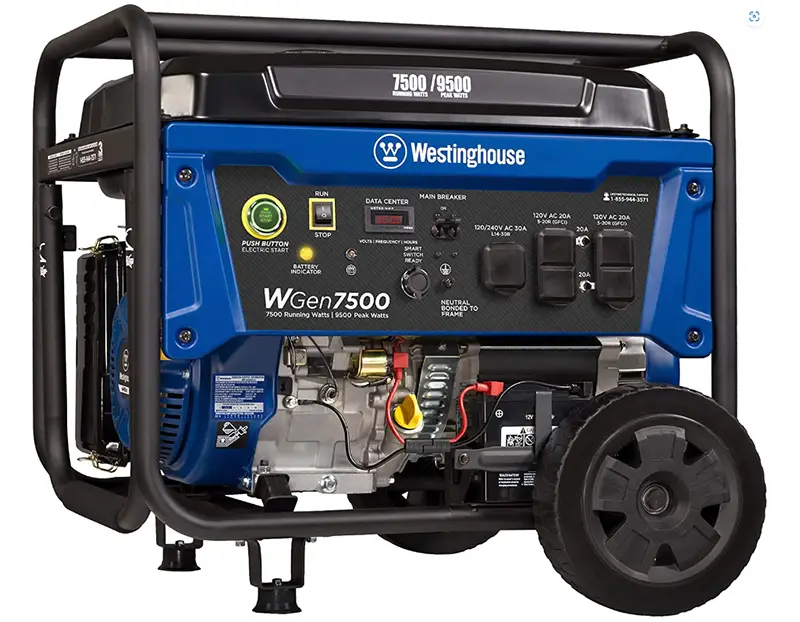
Make: Westinghouse
Model: WGen3600
Electric Start: No
Fuel: Gasoline
Technology: Traditional open frame
Gas Starting Watts: 4650
Gas Running Watts: 3600
Weight (lbs): 107
Noise (dB): 68
This model is aimed at a growing number of people who need backup power during a power outage. It may also be a good oprion if you are looking for a generator to power your travel trailer, or for other outdoor recreational activities, as well as work on remote job sites.
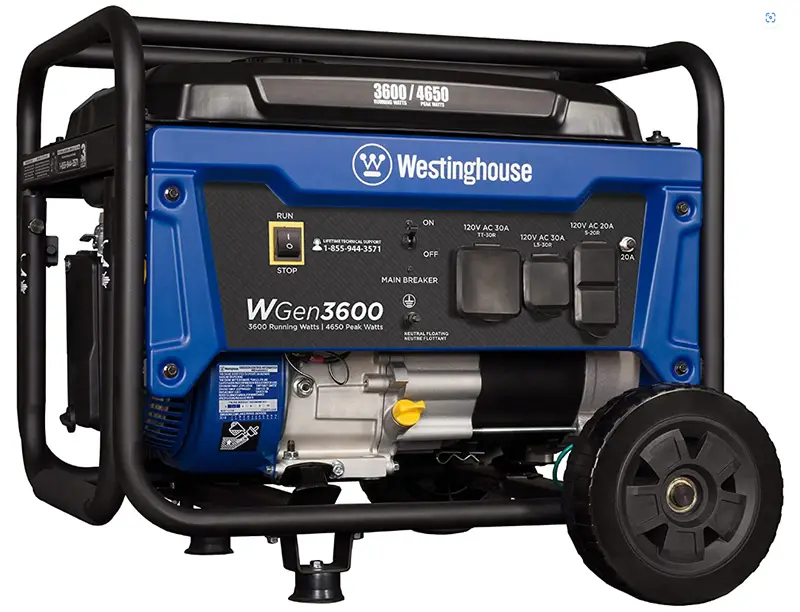
Make: Westinghouse
Model: WGen12000
Electric Start: Yes
Fuel: Gasoline
Technology: Traditional open frame
Gas Starting Watts: 15000
Gas Running Watts: 12000
Weight (lbs): 352
Noise (dB): 74
The most powerful portable generator made by Westinghouse, it’s housed in a hardened-steel open frame and comes with both a push-button electric start and a wireless key fob for remote starting. It’s a great option to power many of your home’s power-hungry appliances during blackouts.
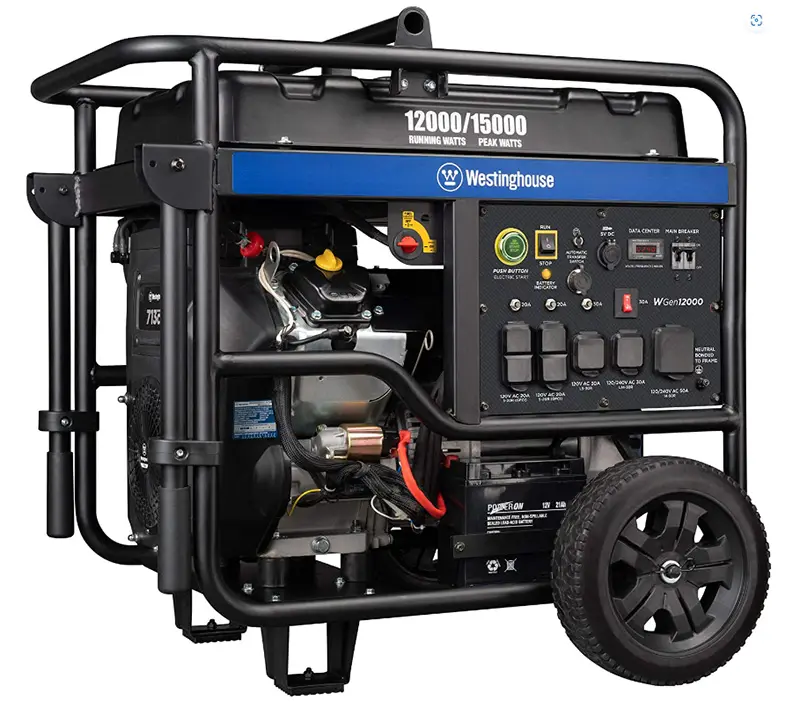
Make: Westinghouse
Model: iGen4500
Electric Start: Yes
Fuel: Gasoline
Technology: Inverter
Gas Starting Watts: 4500
Gas Running Watts: 3700
Weight (lbs): 98
Noise (dB): 52
Offering medium-power, this inverter has features that finely balance portability, quality, reliability and wattage. It’s suitable for recreational uses and is a good source of emergency power. And you can connect it to and run parts of your home when the power grid goes down.

Make: Westinghouse
Model: iGen2200
Electric Start: No
Fuel: Gasoline
Technology: Inverter
Gas Starting Watts: 2200
Gas Running Watts: 1600
Weight (lbs): 48.5
Noise (dB): 50
This is a compact, quiet and lightweight inverter, ideal for camping, tailgating, boating and other recreational activities. It can be useful for short-term emergency backup of very basic home essentials and it can power most portable refrigerators and other equipment while away from home.

Make: WEN
Model: 56200i
Electric Start: No
Fuel: Gasoline
Technology: Inverter
Gas Starting Watts: 2000
Gas Running Watts: 1600
Weight (lbs): 39
Noise (dB): 50
The WEN SQ56200i is a light and super quiet portable inverter making it an attractive option for weekend camping and tailgating where it is able to power lights, a small microwave, music system or a laptop. It could also be a useful additional power source for boat and RV owners.

Make: WEN
Model: GN6000
Electric Start: No
Fuel: Gasoline
Technology: Closed frame inverter
Gas Starting Watts: 6000
Gas Running Watts: 5000
Weight (lbs): 119
Noise (dB): 69
This is an open frame model which is both compact and reasonably powerful. It’s a decent option for emergency power backup of basic essentials in your home. It can also be a power source for an RV or camper and for powering tools away from home and on job sites.
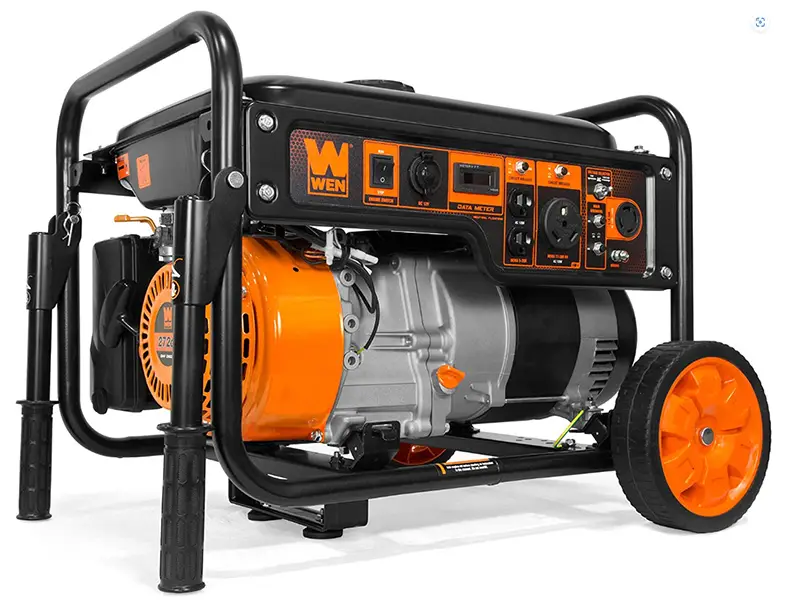
Make: WEN
Model: GN400i
Electric Start: No
Fuel: Gasoline
Technology: Inverter
Gas Starting Watts: 4750
Gas Running Watts: 3750
Weight (lbs): 66.1
Noise (dB): 67
The GN400i has an open frame with a compact, lightweight and innovative design. Inverter technology delivers clean power for use with sensitive electronics, and it’s ideal for a jobsite, campsite, and your RV. In the home it can run a fridge, lights and freezer when grid power goes down.

Make: WEN
Model: 56475
Electric Start: Yes
Fuel: Gasoline
Technology: Traditional open frame
Gas Starting Watts: 4750
Gas Running Watts: 3750
Weight (lbs): 112.5
Noise (dB): 67
A medium-power and competitively priced open frame generator equipped that is equipped with an electric start. It’s fairly compact size makes it good for use with an RV and on camping trips. It can also act as an independent source for some home backup power during an emergency.

Make: WEN
Model: 56380i
Electric Start: Yes
Fuel: Gasoline
Technology: Inverter
Gas Starting Watts: 3800
Gas Running Watts: 3400
Weight (lbs): 99.2
Noise (dB): 57
This WEN portable inverter has a lot going for it. It’s reasonably powerful, affordable, compact, lightweight, and quiet. Buyers include recreational users, boat and RV owners, and those who need to power basic equipment for short periods when access to the the grid is not possible.

Make: WEN
Model: 56225i
Electric Start: No
Fuel: Gasoline
Technology: Inverter
Gas Starting Watts: 2250
Gas Running Watts: 1800
Weight (lbs): 48.5
Noise (dB): 53
This is another compact, lightweight, and super quiet inverter from WEN. It has a variety of light recreational applications for campers, boat and RV owners, and for very limited backup of really essential appliances for short periods during a blackout. Being an inverter, it’s safe to use with sensitive electronics.

Make: WEN
Model: 56203i
Electric Start: No
Fuel: Gasoline
Technology: Inverter
Gas Starting Watts: 2000
Gas Running Watts: 1700
Weight (lbs): 39
Noise (dB): 51
The WEN 56203i portable inverter r is a very affordable, compact, lightweight, and quiet model. It’s aimed at recreational users, boat and RV owners, and for powering very basic appliances for a short time during power outages. Inverter technology means you can safely power sensitive electronics.

Make: Honda
Model: EU2200i
Electric Start: No
Fuel: Gasoline
Technology: Inverter
Gas Starting Watts: 2200
Gas Running Watts: 1800
Weight (lbs): 46.5
Noise (dB): 48
The Honda EU2200i is a premium portable inverter renowned for its durability and reliability. It’s both quiet and relatively light and is an excellent solution for recreational activities and for powering your RV and tools. It’s also used for providing limited short-term power during when needed.

Make: Generac
Model: iQ3500
Electric Start: Yes
Fuel: Gasoline
Technology: Inverter
Gas Starting Watts: 3500
Gas Running Watts: 3000
Weight (lbs): 109.1
Noise (dB): 0
The gasoline powered iQ3500 is an inverter that offers the benefits of powering equipment and devices while away from home making it ideal for recreational activities such as tailgating and camping trips.The durable, yet lightweight, design is engineered for practicality and easy portability.

Make: Generac
Model: GP3500iO
Electric Start: No
Fuel: Gasoline
Technology: Inverter
Gas Starting Watts: 3500
Gas Running Watts: 3000
Weight (lbs): 74.3
Noise (dB): 0
The Generac GP3500iO is an open frame inverter featuring advanced PowerRush™ technology, which delivers over 50% more starting power. It’s both quiet and light and is an ideal companion for camping and your RV. It’s can aslo help power essential appliances when the grid goes down.

Make: Generac
Model: GP3600
Electric Start: No
Fuel: Gasoline
Technology: Traditional open frame
Gas Starting Watts: 4500
Gas Running Watts: 3600
Weight (lbs): 105
Noise (dB): 0
The Generac GP3600 is an open frame generator that aims to provide you with backup power for multiple appliances in emergency situations. It’s also used by owners as a power source for their RVs, for camping trips, and working with power tools away from a utility electricity supply.

Make: Generac
Model: GP8000E
Electric Start: Yes
Fuel: Gasoline
Technology: Traditional open frame
Gas Starting Watts: 10000
Gas Running Watts: 8000
Weight (lbs): 198
Noise (dB): 0
The GP8000E offers impressive outputs that make it a favorite for emergency power or recreational use. It’s OHV engine is housed in a hardened 1.25 inch steel-tube cradle and comes with a large-capacity tank and fuel gauge, covered outlets, heavy-duty no-flat wheels, and a fold-down handle for easy transport.
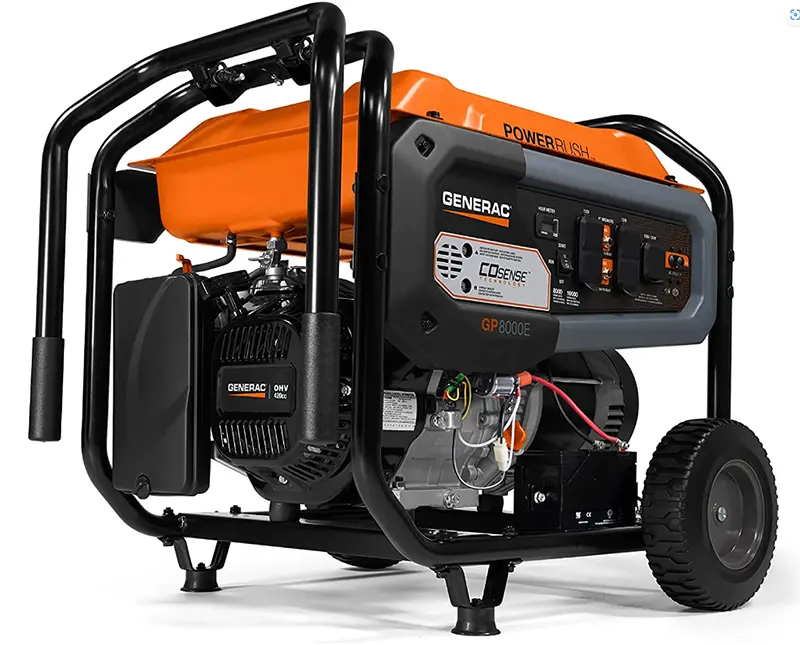
Make: Generac
Model: GP2200i
Electric Start: No
Fuel: Gasoline
Technology: Inverter
Gas Starting Watts: 2200
Gas Running Watts: 1700
Weight (lbs): 48
Noise (dB): 0
The GP2200i inverter provides an economical portable power solution for outdoor enthusiasts as it provides the stable and quiet power they need. It’s a compact unit and has a fully-enclosed lightweight design to make transportation easy. All in all, the Generac GP2200i represents great value.

Make: DuroStar
Model: DS10000E
Electric Start: Yes
Fuel: Gasoline
Technology: Traditional open frame
Gas Starting Watts: 8000
Gas Running Watts: 10000
Weight (lbs): 218
Noise (dB): 72
From the DuroMax brand, this DuroStar DS10000E is one of the most powerful gasoline-only devices in DuroStar’s lineup. It’s aimed largely at people who demand the security of plenty of home standby power when connected into their home, and for working on larger jobsites.

Make: DuroMax
Model: XP4400E
Electric Start: Yes
Fuel: Gasoline
Technology: Traditional open frame
Gas Starting Watts: 4400
Gas Running Watts: 3500
Weight (lbs): 122
Noise (dB): 69
This gas-powered generator is a dependable workhorse able to keep your lights on in a blackout. Its 4-stroke OHV 212cc engine provides enough output to power lights and a refrigerator and even a small home air conditioner. It has an electric start and is fairly compact. It may be ideal for those who don’t need anything bigger.

Make: DuroMax
Model: XP15000E
Electric Start: Yes
Fuel: Gasoline
Technology: Traditional open frame
Gas Starting Watts: 15000
Gas Running Watts: 12000
Weight (lbs): 380
Noise (dB): 84
The XP15000E is the most powerful gas-powered generator produced by DuroMax. Its big and robust 713cc V-twin engine provides the sort of power you’ll find in a large fixed standby generator but offers you all the benefits of portability. It’s an ideal solution for home backup and jobsites and is perfect for anyone looking for a high-end power source.
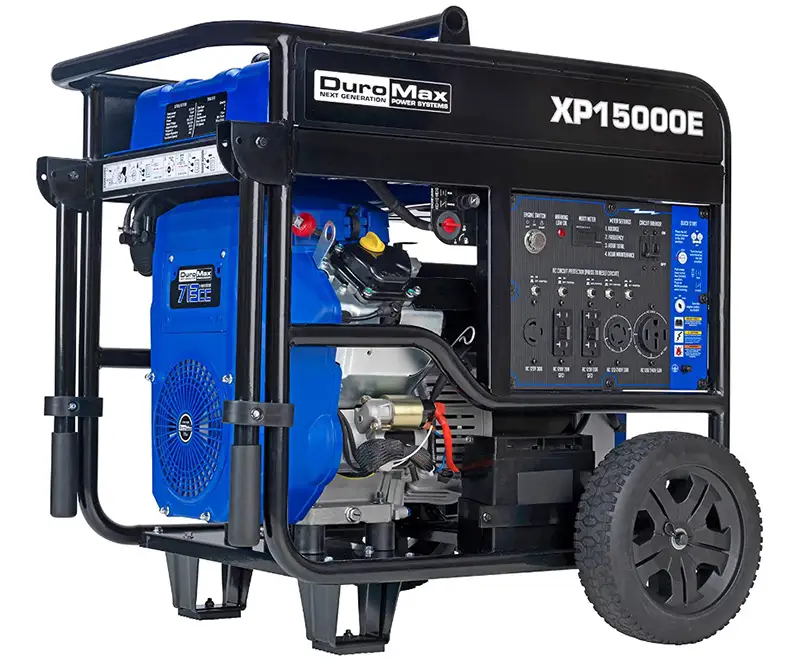
Make: DuroMax
Model: XP13000E
Electric Start: Yes
Fuel: Gasoline
Technology: Traditional open frame
Gas Starting Watts: 13000
Gas Running Watts: 10500
Weight (lbs): 234
Noise (dB): 74
The 13000XP is the largest and most powerful gasoline generator in the X Series. It has a robust DuroMax 500cc OHV engine and figures among the top solutions for whole home backup with power normally found in a home standby unit. It’s the sister of the dual fuel XP1300EH.
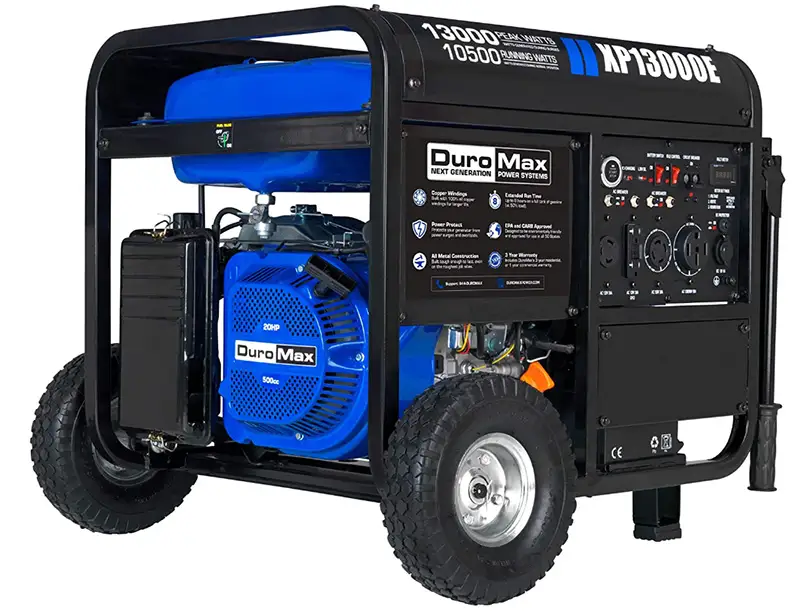
Make: Champion
Model: 201004
Electric Start: Yes
Fuel: Gasoline
Technology: Traditional open frame
Gas Starting Watts: 9375
Gas Running Watts: 7500
Weight (lbs): 201.7
Noise (dB): 74
The Model 201004 is a powerful single fuel generator which can power much of your home for short periods when that becomes necessary. It has an electric star and is a good choice for working with multiple power tools and equipment on jobsites. If you are more interested in dual fuel, the Champion 100813 may be what you need..

Make: Champion
Model: 100813
Electric Start: Yes
Fuel: Gasoline
Technology: Traditional open frame
Gas Starting Watts: 9375
Gas Running Watts: 7500
Weight (lbs): 202.8
Noise (dB): 74
The Model 100813 is a powerful single fuel generator capable of powering much of your home for short periods when the grid goes down. It’s also a good choice for people working with multiple power tools and equipment on job sites. If you are more interested in dual fuel, the Champion Model 100891 may be an alternative option to consider.

Make: Champion
Model: 100692
Electric Start: No
Fuel: Gasoline
Technology: Inverter
Gas Starting Watts: 2000
Gas Running Watts: 1700
Weight (lbs): 39.5
Noise (dB): 53
This model is described by Champion as ideal for camping, tailgating, powering items around the RV, or providing backup for a few basics in the home. It’s a small, well-built, light weight and low powered portable generator. And it’s one of the quietest around. That said, it is not recommended for emergency home backup.

Make: Champion
Model: 100519
Electric Start: No
Fuel: Gasoline
Technology: Inverter
Gas Starting Watts: 6250
Gas Running Watts: 5000
Weight (lbs): 121
Noise (dB): 70
The Champion 100519 has an open frame design and an innovative shape. It integrates Quiet Technology and is said to be 50% quieter than comparable 5000 watt generators. Champion also say that they have also managed to make it 20% lighter by redesigning a smaller footprint, in other words reducing its overall shape and size.

Make: Briggs & Stratton
Model: Q6500
Electric Start: No
Fuel: Gasoline
Technology: Inverter
Gas Starting Watts: 6500
Gas Running Watts: 5000
Weight (lbs): 139
Noise (dB): 66
The Quiet Power Series Q6500 packs a lot of power for a closed frame portable generator. It has a 306cc engine which is fitted with CO Guard to help keep you safe from toxic carbon monoxide fumes while the unit is operating in the open air. Inverter technology makes it a safe bet for you to use with sensitive electronics.

Make: Briggs & Stratton
Model: P4500
Electric Start: Yes
Fuel: Gasoline
Technology: Inverter
Gas Starting Watts: 4500
Gas Running Watts: 3700
Weight (lbs): 104
Noise (dB): 60
The PowerSmart Series™ P4500 is designed for more serious camping with an RV and other kinds of recreational use than the smaller P2400. It’s also a premium choice for partial home backup during emergencies and power outages. It comes with an electric start and CO Guard, a system to help warn you of dangerous carbon monoxide levels. And being an inverter, it’s okay to connect sensitive electronics.

Make: Briggs & Stratton
Model: P2400
Electric Start: No
Fuel: Gasoline
Technology: Inverter
Gas Starting Watts: 2400
Gas Running Watts: 1800
Weight (lbs): 51
Noise (dB): 62
This Briggs & Stratton has a long run time of 8 hours at 25% load. It is equipped with CO Guard technology to help keep you and your family safe by warning you of the presence of toxic carbon monoxide fumes. It’s able to keep your home essentials powered during an outage and, as an inverter, it’s safe for you to use with sensitive electronics.

Make: A-iPower
Model: SUA4000i
Electric Start: No
Fuel: Gasoline
Technology: Inverter
Gas Starting Watts: 4000
Gas Running Watts: 3500
Weight (lbs): 116.6
Noise (dB): 58
A reasonably sized single fuel (gasoline) portable generator that’s RV-Ready. It’s fairly quiet when working and could be an option to consider if you need a decent amount of power for recreational activities such as camping as well as having an independent power source to cope with an incident like a blackout. And it has inverter technology.

Make: A-iPower
Model: SUA2000i
Electric Start: No
Fuel: Gasoline
Technology: Inverter
Gas Starting Watts: 2000
Gas Running Watts: 1600
Weight (lbs): 46
Noise (dB): 58
A compact and highly portable inverter, the A-iPower SUA2000i is designed to power basic appliances like mobile phones, tablets, radios, televisions, fans, lights, and small cookers. It’s an ideal companion for all kinds of recreational activities, including camping, tailgating or just out for a picnic at the weekend.

Make: A-iPower
Model: SC12000E
Electric Start: Yes
Fuel: Gasoline
Technology: Traditional open frame
Gas Starting Watts: 12000
Gas Running Watts: 9000
Weight (lbs): 216
Noise (dB): 78
The A-iPower SUA12000 has more than enough output to power your tools at a construction site, camping ground, or for your home appliances. It has a powerful 459 cc OHV 4 stroke engine and a large 7-gallon gasoline fuel tank to provide an average run time of 14 hours at 25% load. And it comes with electric start so you can get it going quickly and easily when you need to.

Make: A-iPower
Model: SC2000i
Electric Start: No
Fuel: Gasoline
Technology: Inverter
Gas Starting Watts: 2000
Gas Running Watts: 1600
Weight (lbs): 46
Noise (dB): 52
As a compact and highly portable inverter, the A-iPower SC2000i provides clean and quiet 2000 watts of starting power and 1600 watts of running power. It’s equipped with a durable and reliable 79cc Yamaha engine and it’s perfect for all sorts of outdoor activities, including concerts, camping trips, tailgating parties, racetracks and RVs.

Make: Champion
Model: 100302
Electric Start: No
Fuel: Gasoline
Technology: Inverter
Gas Starting Watts: 4000
Gas Running Watts: 3500
Weight (lbs): 81.5
Noise (dB): 64
This Model 100302 from Champion Power Equipment is a Digital Hybrid Open Frame inverter, which is claimed to be 50% quieter and 20% lighter than a traditional 3500 watt generator. It’s aimed at RV owners, campers, those working on small jobsites, and others who need some limited home backup power.

